News
Deptherapy Veterans help to guide coral reef conservation in Chuuk Lagoon
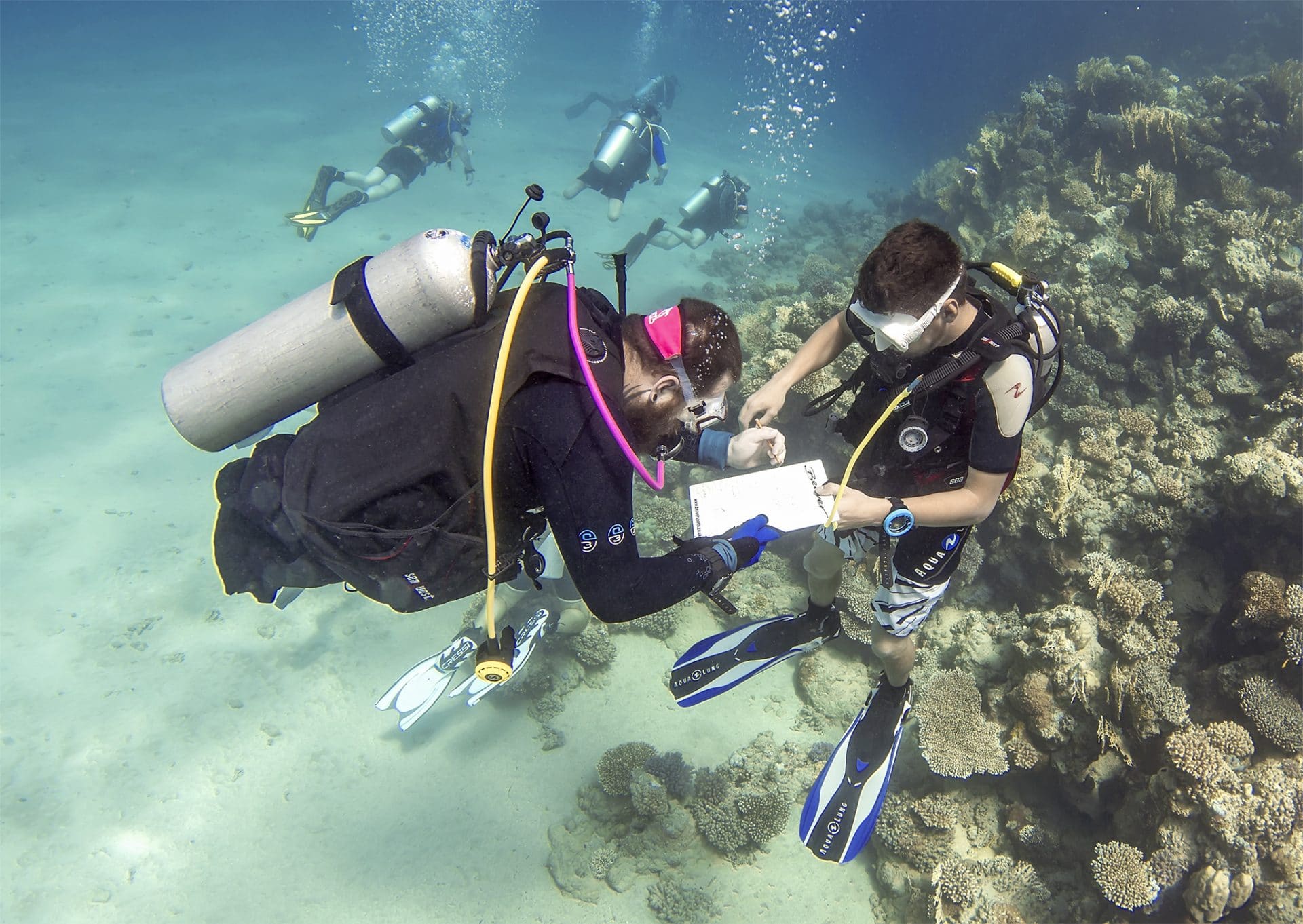
Back in August 2018, a team of UK Veterans from the charity Deptherapy & Deptherapy Education, supported by Coral Cay Conservation (CCC), headed to Chuuk Lagoon, Micronesia, to collect critical ecological data from the Shinkoku Maru, a shipwrecked World War II vessel.
The expedition was part of the wider effort by Deptherapy following the launch of their “Protecting our Oceans” campaign where the charity’s members ‘give back’ to the Oceans that have given so much to them. The aim of the campaign is to raise awareness of the plight of the world’s oceans and for Deptherapy programme members to make their own practical contribution to environmental protection.
Following extensive training at ROOTS Red Sea in May 2018, the Deptherapy team set out to undertake preliminary data collection protocols through SCUBA to ecologically map the fauna and benthic community residing on the Shinkoku Maru. The data, and subsequent report, downloadable below, are to be delivered to resource managers and government bodies in Chuuk lagoon, to provide greater ecological clarity and evidence to facilitate management practices.
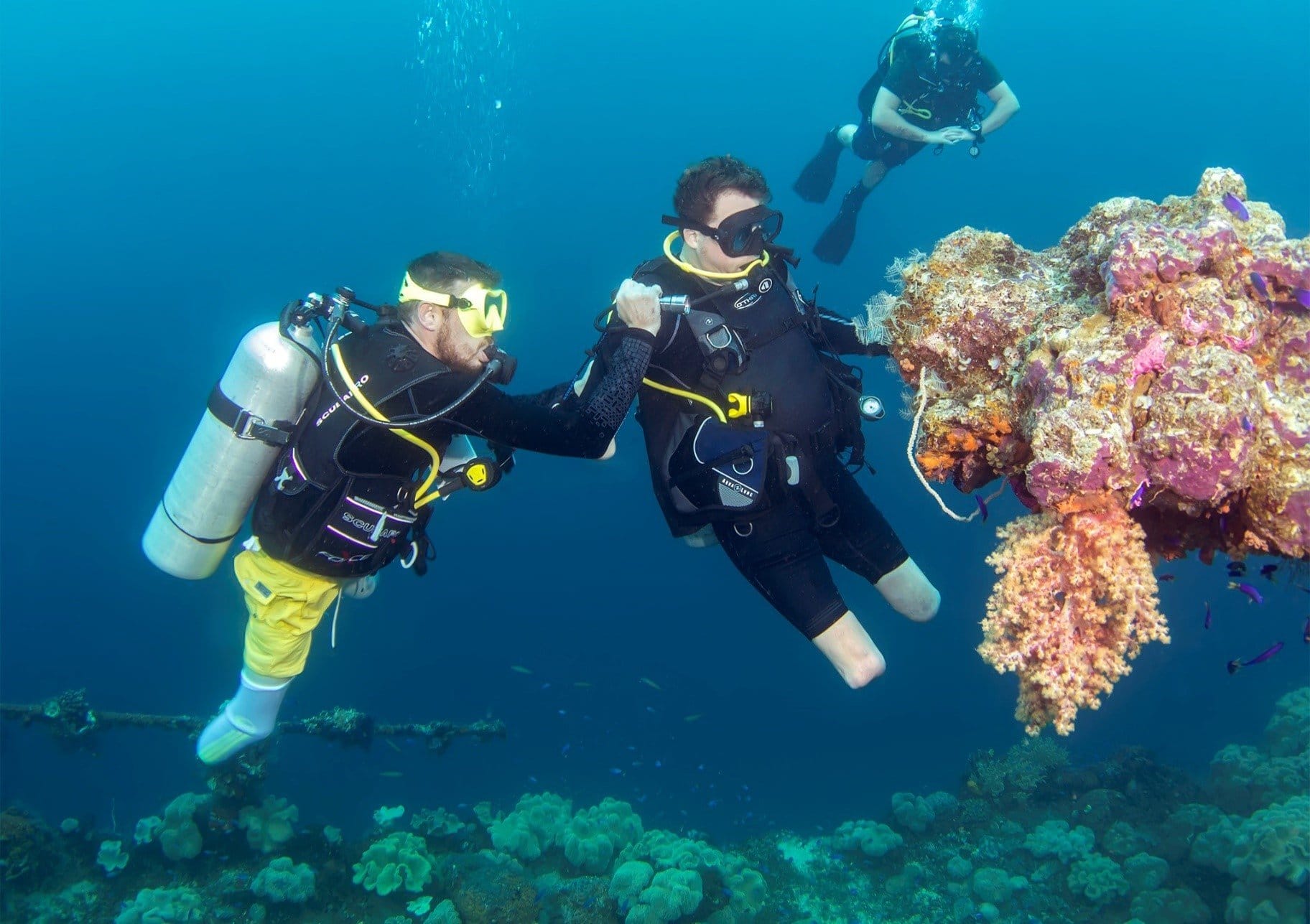
Deptherapy expedition members utilise their training to identify the colourful benthic fauna encrusting shipwrecks in Chuuk Lagoon – Photo: Dmitry Knyazev
The resulting scientific report from the expedition, authored by CCC’s Head of Science, Tom Dallison, and Ben Lee, and supported by Bear Grylls OBE, highlights, notably, that personnel suffering from various physical and mental ailments hold the ability to undertake such studies and that efforts to conserve our Oceans are accessible to all; overcoming the barriers associated with the rigorous physical demands of undertaking scientific data collection protocols through SCUBA.
“This is all about enabling Armed Forces’ Veterans to take action against the plights suffered by our Oceans. It is an inspired and brilliant collaboration and I am proud to be involved.”
Bear Grylls OBE – Global Adventurer
The coral reefs of the Pacific region, including the Federated States of Micronesia (FSM) and Chuuk Lagoon, are in relatively good health and account for approximately 25% of the world’s coral reefs making the region a diver’s paradise! Chuuk Lagoon is one of the worlds largest lagoons, composed of over 2,000km2 of coral reef and lagoon habitat (with an additional 200km barrier reefs), and is an important bio-geographical link between the Coral Triangle and other Pacific island groups. In addition to boasting some of the most extensive coral reef systems in Micronesia, Chuuk Lagoon also has a rich military history and is well known amongst the dive community as the lagoon hosts approximately 50-60 WWII shipwrecks, including 12 aircraft wrecks. One of these shipwrecks, and the wreckage assessed by Deptherapy team members, is the Shinkoku Maru which is a large Japanese oil tanker, found between 11 – 37m.
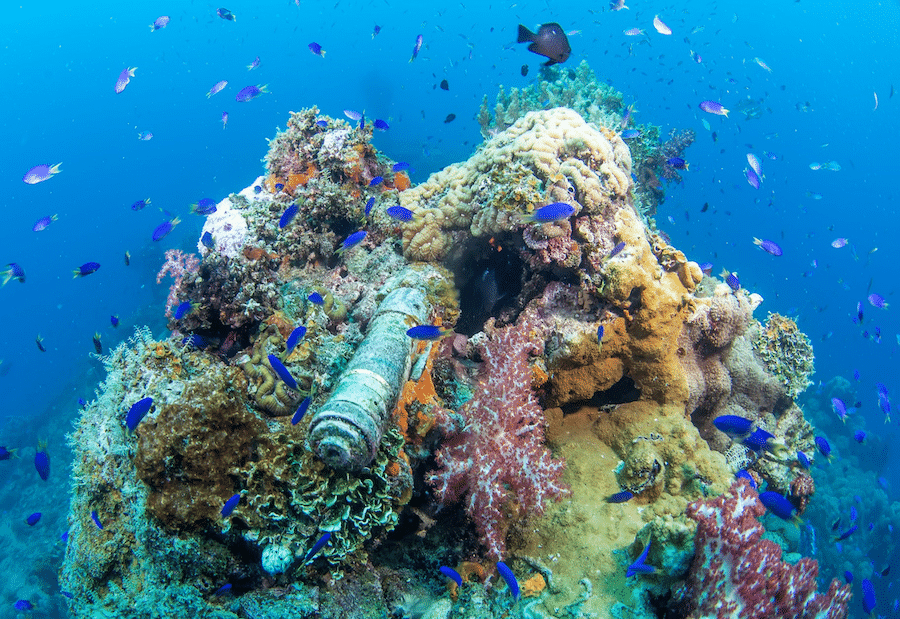
Benthic fauna that occupy many of the shipwrecks throughout Chuuk Lagoon – Photo: Dmitry Knyazev
In addition to the localised physical impacts to coral reefs caused by WWII, the lagoon has continued to experience severe environmental impacts through overfishing, pollution and rising ocean temperatures. Derelict vessels have often been utilised, or intentionally positioned to compensate for natural reef habitat loss and the loss of biodiversity, with evidence presenting high levels of diversity and fish biomass. However, evidence further suggests that, in fact, derelict vessels or shipwrecks support distinct reef-associated fish and benthic communities, possibly increasing an area’s resilience to environmental impacts. As such, Deptherapy’s assessment provides insight into the current ecological status of the Shinkoku Maru wreckage delivering incentives to the dive tourism industry and contributing to conservation efforts in the region.
In order to effectively assess the ecological community of the Shinkoku Maru, the wreck was split into two segments (Bow and Mid-section) to record fish diversity and abundance data. The wreck was then further split into three segments (Bow, Mid, Stern-section) to record the relative composition of benthic substrates that included Hard Coral and the respective lifeform (branching, massive and sub-massive etc.).
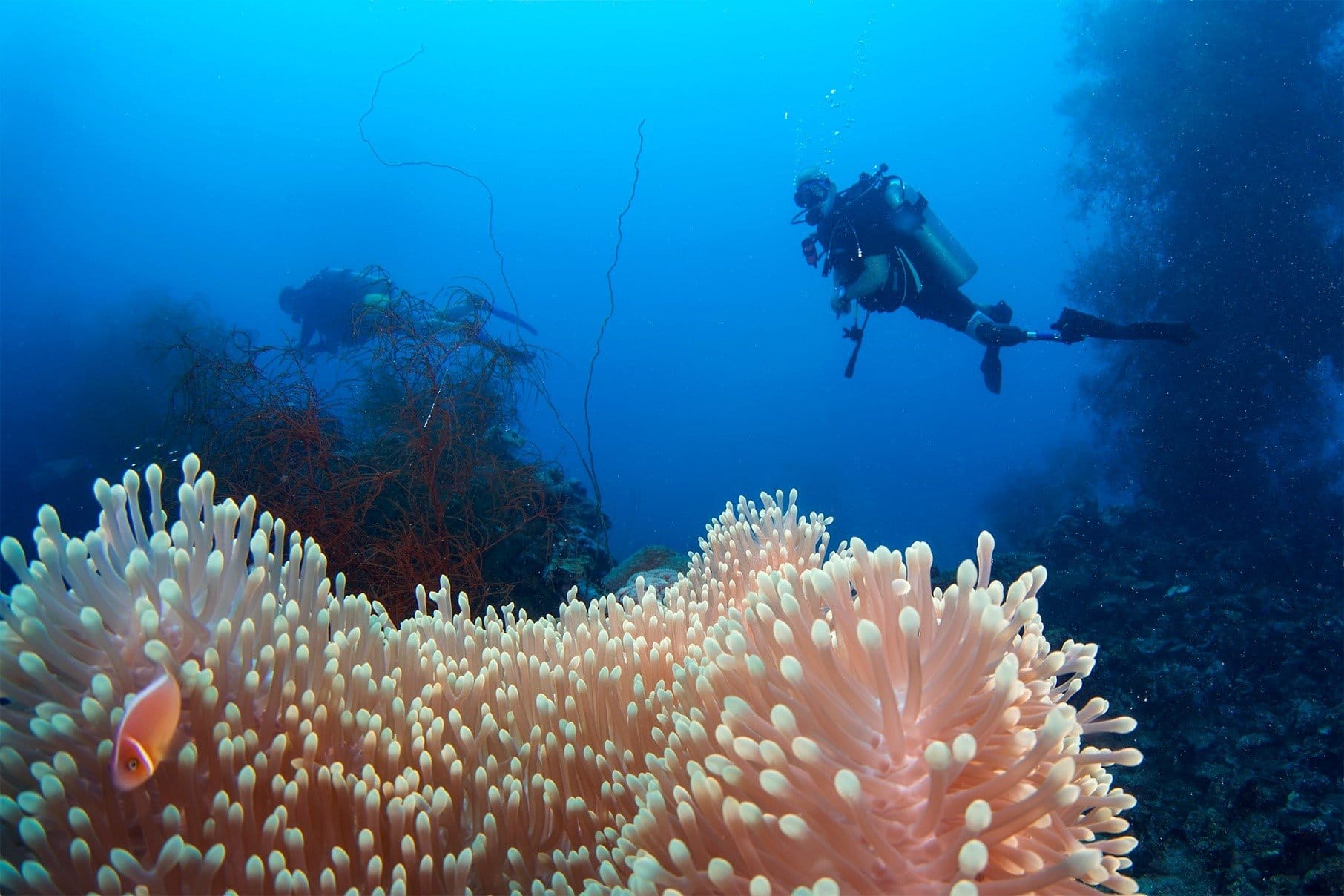
A Deptherapy team member with an adapted prosthetic limb diving in Chuuk Lagoon amongst the incredible biodiversity of the Pacific region – Photo: Dmitry Knyazev
Fishes were recorded as an exposure rate (per minute) by the Deptherapy team with Surgeonfish (Acanthuridae) recorded in the greatest abundance, followed by the Eastern Triangle Butterflyfish (Chaetodon baronessa). Throughout the assessment of the wreck, the survey team were also greeted by 12 Whitetip Reef Sharks (Triaenodon obesus) and one turtle!
The exposure rates and diversity of fishes was a positive find for Deptherapy with an abundance of marine life found across the entire wreckage. Following the sizing (cm) of each individual fish, it was found that species were dominated by smaller individuals, often an indication of overfishing as the majority of larger fish are removed by fisherfolk. The sizing of individual fishes enabled the Deptherapy team to calculate biomass (kg) which was found to differ between each section of the wreck indicating that specific areas were favoured by particular species, possibly driven by refuge or prey availability.
Assessments of the benthic community found that Hard Corals covered approximately 25% of the wreckage with a fairly homogeneous distribution across the entire wreck proving both positive from an ecological perspective and touristic potential as, due to the range of depths, divers of all abilities can enjoy the diverse corals of the vessel. The lifeform of the recorded Hard Coral was also found to be homogeneous further supporting the wreck’s accessibility and ecological value.
The abundance of a seemingly even distribution and diversity of Hard Corals on the Shinkoku Maru wreck, as well as the presence of specialised obligate corallivorous butterflyfish species and apex predators, such as Whitetip Reef Sharks, indicates that the community associated with the Shinkoku Maru wreck is in good ecological status, proving positive for the ecological characteristics and services of the survey area as well as for tourism. However, low levels of biomass and the dominance of smaller individuals should be investigated further.
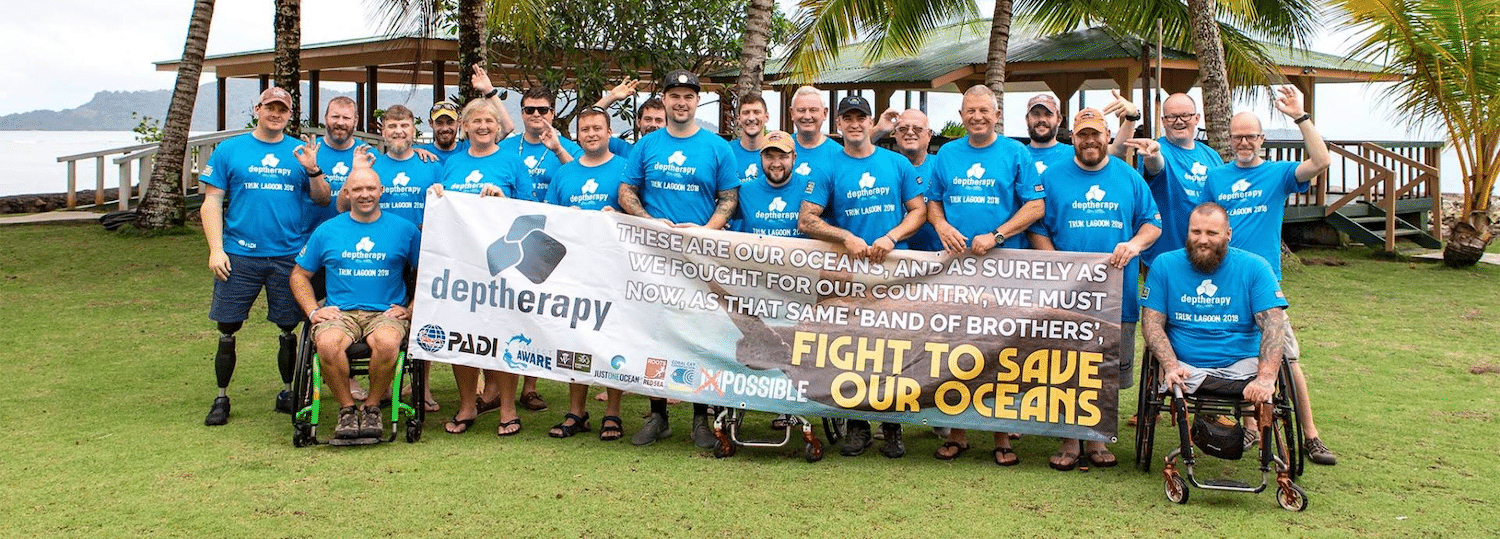
Deptherapy launch their “Protecting Our Oceans” campaign in Chuuk Lagoon, Federated States of Micronesia (FSM) in August 2018 – Photo: Dmitry Knyazev
Deptherapy Programme Member Ben Lee summarised the Chuuk Lagoon expedition and the achievement by the survey team:
“Completing the study was a massive achievement for the Deptherapy team, not only because we had accomplished our set aims in Truk [Chuuk], but also proved to the world that we, as disabled veterans, missing limbs and having mental health issues, can conduct our own conservation-orientated studies and help in the protection of our Oceans; a pledge we have made through our Protecting Our Oceans Campaign.”
Download the full report, entitled “Chuuk Lagoon, Micronesia; a 2018 Ecological Assessment of the Shinkoku Maru Wreck – 2019″. If you have any further queries about the report or the organisations involved, you can contact Coral Cay Conservation or Deptherapy for further information.
Gear News
Introducing the TR-80, IR-50 and CS-30 Regulators from DYNAMICNORD

Whether you are a beginner or a professional diver – with the three new main regulators from DYNAMICNORD, everyone will find their favourite regulator. They all look super stylish.
Excellent performance with the TR-80
Quality and performance are the be-all and end-all for regulators. It is not for nothing that the TR stands for Tec Reg. The innovative design of the TR-80 guarantees absolute reliability – even in ice-cold waters.

Perfect breathing effort at 0.8 J/l / certified for diving in waters below 10 degrees / structural design made of solid brass for best cold protection / membrane-compensated design with dry seal of the first stage / reduced exhalation effort thanks to optimized exhalation membrane and bubble deflector / adjustable Venturi (dive/predive) and adjustment knob for individual inhalation comfort / innovative design of the front cover prevents free-flow in strong currents or when diving with scooters / design made of sandblasted brass, matt chrome finish / 2 HP and 4 LP outlets / mouthpiece made of high-quality, anti-allergic silicone for maximum comfort.


Amazing underwater adventures with the IR-50
The IR-50 is the top regulator for advanced and experienced divers. Natural breathing is the essence of this regulator.

Ideal breathing effort at 0.8 J/l /certified for diving in waters below 10 degrees / compensated membrane / adjustable venturi (dive/predive) and adjustment knob for individual inhalation comfort/ outlet valve and deflector for minimum exhalation effort and reduction of bubbles on the face / design made of sandblasted brass, matt chrome finish / 2 HP and 4 NP outlets / mouthpiece made of high-quality, anti-allergic silicone for maximum comfort.


The Workhorse – our CS-30
For diving centres and diving beginners – the workhorse stands for strong construction, reliability and robustness. Perfect for your training.

Optimal breathing effort at 0.8 J/l /recommended for diving in waters above 10 degrees / non-compensated piston / adjustable venturi (dive/predive) / outlet valve and deflector for minimum exhalation effort and reduction of bubbles on the face / design made of sandblasted brass, matt chrome finish / 1 HP and 3 NP outlets / mouthpiece made of high-quality, anti-allergic silicone for maximum comfort.


Octopus OP-30
The OP-30 is the ideal addition to all DYNAMICNORD regulators. It is identical in construction to the CS-30.

The TR-80, IR-50, CS-30 (DIN & INT) regulators and the Octopus OP-30 are available from DYNAMICNORD dealers and in the online store.
DYNAMICNORD – Your Outdoor Companion.
Marine Life & Conservation
Paul Watson Released as Denmark Blocks Japan’s Extradition Bid

Renowned anti-whaling activist Paul Watson has been released from custody in Greenland after spending five months in detention. Denmark’s Justice Ministry rejected Japan’s request for his extradition, citing insufficient guarantees that his time already served in custody would be credited against any potential sentence.
The 74-year-old Canadian-American was arrested on July 21 in Nuuk, Greenland’s capital, when his ship docked to refuel. His arrest was based on a 2012 Japanese warrant related to a 2010 encounter in Antarctic waters. Japan alleged Watson obstructed operations and caused damage to a whaling research ship during efforts to disrupt illegal whaling. Watson has consistently denied these claims, maintaining his commitment to marine conservation.
Denmark, which oversees extradition matters for Greenland, concluded that while the legal conditions for extradition were met, the lack of assurances from Japan regarding time-served credit made extradition untenable.
In a video shared by his foundation, Watson expressed gratitude and relief, saying, “After five months, it’s good to be out… and good to know they’re not sending me to Japan.” He added that the most difficult part of his time in custody was being separated from his two young sons.
Watson is a pioneering figure in marine conservation, known for founding the Captain Paul Watson Foundation in 2022 after decades of activism with the Sea Shepherd Conservation Society. His bold efforts to defend marine life have earned him widespread support, including from celebrities and conservationists. His work has also been featured in the acclaimed reality TV series Whale Wars.
Watson’s lawyer, Jonas Christoffersen, praised the decision, stating, “We are happy and relieved that Paul Watson is now free.” He added that Watson is eager to reunite with his family and continue his vital work.
The arrest occurred while Watson’s vessel, the M/Y John Paul DeJoria, was en route to the North Pacific with a team of 26 volunteers to intercept a Japanese whaling ship. His foundation described the arrest as politically motivated and emphasized that Watson’s actions were focused on ending illegal whaling practices.
Japan resumed commercial whaling in 2019 after leaving the International Whaling Commission, asserting that whale meat is a cultural tradition. Conservationists, however, continue to challenge these practices, highlighting their impact on marine ecosystems.
Despite the challenges, Watson remains steadfast in his mission to protect marine life and bring attention to whaling practices. His dedication to ocean conservation has made him a globally respected advocate for the environment.
-

 News2 months ago
News2 months agoIconic SS United States to become the World’s Largest Artificial Reef
-

 News3 months ago
News3 months agoBook Review – 52 Assignments: Underwater Photography
-

 Gear News3 months ago
Gear News3 months agoDYNAMICNORD – New German diving brand enters the British market
-

 News3 months ago
News3 months agoExploring Cenote El Pit: A Diver’s Dream
-

 Gear News3 months ago
Gear News3 months agoTry BARE drysuits (and maybe even win one!) this Friday with Sea & Sea at North West Dive Fest
-

 Marine Life & Conservation3 months ago
Marine Life & Conservation3 months agoBook Review: Coral Triangle Cameos
-

 Blogs2 months ago
Blogs2 months agoDive the Egyptian Red Sea this Autumn with Regaldive
-

 News3 months ago
News3 months ago2024 Ocean Art Underwater Photo Competition Announced















